Popular Muscadine Cultivars in North Carolina
go.ncsu.edu/readext?243078
en Español / em Português
El inglés es el idioma de control de esta página. En la medida en que haya algún conflicto entre la traducción al inglés y la traducción, el inglés prevalece.
Al hacer clic en el enlace de traducción se activa un servicio de traducción gratuito para convertir la página al español. Al igual que con cualquier traducción por Internet, la conversión no es sensible al contexto y puede que no traduzca el texto en su significado original. NC State Extension no garantiza la exactitud del texto traducido. Por favor, tenga en cuenta que algunas aplicaciones y/o servicios pueden no funcionar como se espera cuando se traducen.
Português
Inglês é o idioma de controle desta página. Na medida que haja algum conflito entre o texto original em Inglês e a tradução, o Inglês prevalece.
Ao clicar no link de tradução, um serviço gratuito de tradução será ativado para converter a página para o Português. Como em qualquer tradução pela internet, a conversão não é sensivel ao contexto e pode não ocorrer a tradução para o significado orginal. O serviço de Extensão da Carolina do Norte (NC State Extension) não garante a exatidão do texto traduzido. Por favor, observe que algumas funções ou serviços podem não funcionar como esperado após a tradução.
English
English is the controlling language of this page. To the extent there is any conflict between the English text and the translation, English controls.
Clicking on the translation link activates a free translation service to convert the page to Spanish. As with any Internet translation, the conversion is not context-sensitive and may not translate the text to its original meaning. NC State Extension does not guarantee the accuracy of the translated text. Please note that some applications and/or services may not function as expected when translated.
Collapse ▲Wine/Juice Processing
Carlos
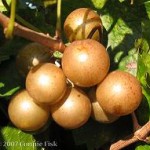
Ninety to ninety-five percent of the commercial muscadine production in North Carolina is Carlos. Carlos is a vigorous, productive, self-fertile cultivar bred in North Carolina. Uniform ripening facilitates mechanical harvesting of this cultivar. The primary use of Carlos is for wine and juice processing. It does have a dry stem scar, making it acceptable as a fresh market cultivar, though its small size and bitter, tough skin lowers its rating in consumer taste tests. Carlos also has a tendency to “brown” when placed on grocery shelves after being stored under refrigeration. Carlos is one of the most cold-tolerant cultivars when completely dormant in the winter. However, it is prone to early budbreak and may experience cold damage from late spring freezes or frosts (see Freeze Damage).
Noble
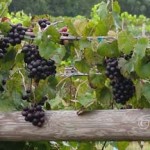
Noble is the primary red muscadine cultivar used in wine and juice production. It is a highly productive, vigorous, self fertile cultivar also bred in North Carolina. Its small size and wet stem scar prevent its use for anything but processing. Noble is relatively cold tolerant.
Doreen
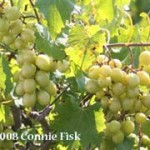
Doreen is another self-fertile processing cultivar used for wine and juice in North Carolina. It is highly vigorous and productive, producing flavorful “football-shaped” fruit.
Magnolia
Magnolia is also a self-fertile processing cultivar originating from a North Carolina cross. It is used primarily in wine and juice processing due to its wet stem scar. Magnolia is known for its uneven ripening. Magnolia is relatively cold tolerant.
Welder
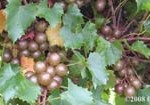
Welder is a self-fertile processing cultivar out of Florida. Vines are vigorous and productive. Welder has uniform ripening with a wet stem scar. Very little commercial acreage is currently grown in North Carolina
Fresh Marketing
Alachua
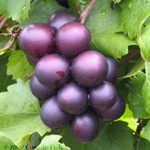
Alachua is a self-fertile cross out of Florida. It ripens uniformly with a dry stem scar. Alachua is primarily a fresh market cultivar.
Darlene
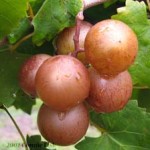
Darlene is a female cultivar available from Ison’s Nursery in Georgia. Fruit have excellent flavor with high sugar content, suitable for the fresh market.
Fry
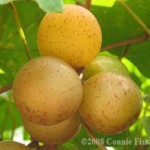
Fry is a favorite U-pick muscadine cultivar out of Georgia. It is a female cultivar with a wet stem scar, limiting its usefulness in the retail market. Fry is prone to ripe rot and winter cold damage.
Granny Val
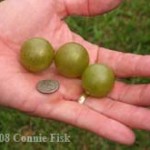
Granny Val is a large, self-fertile, fresh market cultivar available from Ison’s Nursery in Georgia. It ripens very late in North Carolina and may be subject to damage by wet weather in the fall. It also has a wet stem scar if picked under-ripe, so may be best suited to U-pick operations.
Jumbo
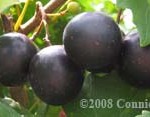
Jumbo is a large, black, female cultivar suitable for U-pick operations. Vines are vigorous and productive, but the fruit are astringent when under-ripe and have a strong undesirable flavor when over-ripe.
Nesbitt
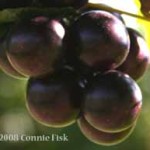
Nesbitt is a large, black, self-fertile cultivar bred in North Carolina. Fruit ripens over a three-week period and is suitable for fresh marketing. It is one of the most cold-tolerant fresh market varieties available. Nesbitt is one of the top 5 fresh cultivars recommended in North Carolina.
Scarlett
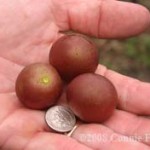
Scarlett is a self-fertile, fresh market cultivar out of Georgia. It has good flavor and a dry stem scar, suitable for the fresh market.
Summit
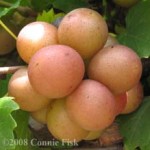
Summit is a large, bronze, female cultivar out of Georgia. Vines are vigorous and productive, producing sweet fruit with a dry stem scar and uniform ripening. Summit is less susceptible to winter cold damage than many of the other fresh market cultivars out of Georgia. Summit is one of the top 5 fresh cultivars recommended in North Carolina.
Supreme
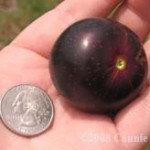
Supreme is a very large, black, female, fresh market cultivar available from Ison’s Nursery in Georgia. Its large size and edible skin make it a favorite in consumer taste tests. Supreme is one of the top 5 fresh cultivars recommended in North Carolina.
Sweet Jenny
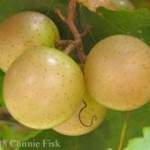
Sweet Jenny is a very large, bronze, female cultivar. It has very good flavor and high sugar content, but its wet stem scar limits its suitability for retail sales. It will do well for U-pick operations and has good disease resistance and cold tolerance.
Tara
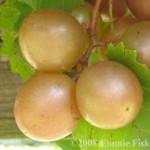
Tara is a large, self-fertile cultivar out of Georgia, similar in size and quality to Fry. It has good flavor, high sugar content, and a very dry stem scar. Tara is one of the top 5 fresh cultivars recommended in North Carolina.
Triumph
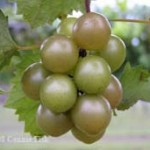
Triumph is a self-fertile cultivar out of Georgia. Production and vigor are good. Fruit can develop a slight reddish color when fully ripe, which some retail buyers dislike. Fruit ripen early in the season and have good flavor, high sugar content, and “crunchy” pulp. Triumph is one of the top 5 fresh cultivars recommended in North Carolina.
Characteristics of Popular Muscadine Cultivars in North Carolina
(from Whit Jones, Duplin County Cooperative Extension Agent, 2006; Updated by Mark Hoffmann, NC State Extension Specialist, 2023)
| Bronze | Black | |||||||
| Cultivar |
Ripening
|
Size
|
Stem Scar
|
Cultivar |
Ripening
|
Size
|
Stem Scar
|
|
| Early Fry (F) |
Very Early
|
Large
|
Wet
|
Sugargate (F) |
Early
|
Very Large
|
Wet
|
|
| Triumph (SF) |
Early
|
Medium
|
Dry
|
Noble (SF) |
Early-Mid
|
Very Small
|
Wet
|
|
| Carlos (SF) |
Early-Mid
|
Small
|
Wet
|
Supreme (F) |
Early-Mid
|
Very Large
|
Dry
|
|
| Florida Fry (SF) |
Early-Mid
|
Large
|
Dry
|
Ison (SF) |
Early-Mid
|
Large
|
Dry
|
|
| Summit (F) |
Early-Mid
|
Large
|
Dry
|
Polyanna (SF) |
Mid-season
|
Large
|
Dry
|
|
| Tara (SF) |
Early-Mid
|
Very Large
|
Dry
|
Alachua (SF) |
Mid-season
|
Medium
|
Dry
|
|
| Scarlett (F) |
Mid-season
|
Large
|
Dry
|
Nesbitt (SF) |
Mid-Late
|
Large
|
Dry
|
|
| Golden Isles (SF) |
Mid-Late
|
Medium
|
Dry
|
Rosa (red) (F) |
Mid-Late
|
Very Large
|
Wet
|
|
| Doreen (SF) |
Late-Very Late
|
Small
|
Wet
|
Black Fry (F) |
Mid-Late
|
Large
|
Dry
|
|
| Late Fry (SF) |
Very Late
|
Large
|
Dry
|
Paulk (SF) | Mid Season | Large | Dry | |
| Hall (SF) |
Early
|
Medium
|
Dry
|
Lane (SF) |
Early
|
Large
|
Dry
|
|
| Pam (F) |
Mid-Season
|
Medium-Large
|
Dry
|
|||||
| Magnolia (SF) |
Mid-Season
|
Small
|
Wet
|
F – female, SF – self-fertile


